Hither Came Conan: Jason Durall on “Xuthal of the Dusk”
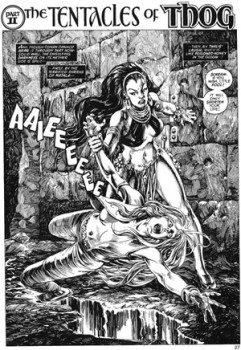
Welcome back to the latest installment of Hither Came Conan, where a leading Robert E. Howard expert examines one of the original Conan stories each week, highlighting what’s best. Jason Durall is the line editor for Modiphius’ RPG, Conan: Adventures in an Age Undreamed Of.
Xuthal of the Dusk on 25 Lunas a Day
Of all of Howard’s Conan stories, “Xuthal of the Dusk” is one of his most emblematic, regardless of its quality compared to the other. If one were to assemble a tasting menu of Conan containing all his recurring themes and story elements, one could look no further than this story and come away with a good sense of the whole. With only one glaringly weak point, the story is an underappreciated gem and worth reconsidering in its place among the overall canon.
First appearing in the September 1933 issue of Weird Tales under the title “The Slithering Shadow”, the story, like many of Howard’s tales, was graced with an extremely risqué cover by Margaret Brundage, no small contributor to the magazine’s sales (more on this later). Though the story’s published title was “The Slithering Shadow”, Howard, in a letter to Clark Ashton Smith, clarifies that its original title was “Xuthal of the Dusk”. Given a choice between the title the story was written under versus a title provided by the editor, let us remain true to Howard’s preference in the matter.
“Xuthal of the Dusk” may not be the best of the Conan stories, but it is one of the purest Conan stories. Let’s examine all the notes this story hits, and this should become clear.
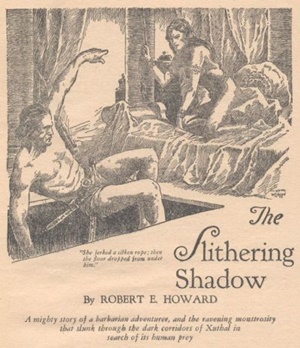 Greatest Hits
Greatest Hits
One of the first and foremost of the themes Howard evoked and explored throughout the Conan stories was his contrast between the barbaric and civilized worlds. He believed in the superiority of the barbaric world (where boldness, self-sufficiency, resilience, and communion with the natural world are common characteristics) versus the conceit of civilization (with vices ranging from weakness, decadence, degeneracy, or at best, naivete and helplessness). Throughout this story are indications about the failures of the folk of Xuthal.
They are a people at the verge of extinction, made helpless by drugs, unwilling and afraid to defend themselves or even flee from the monster they worship. They are sexually degenerate to a degree that impresses an initiate of a fertility goddess of the Southern Kingdoms and there are even more, smaller, seemingly throwaway details, such as the use of gold bars on a window (why would anyone make bars out of gold?) Finally (or perhaps from the very beginning), it’s there in the original title itself, calling Xuthal a city “of the Dusk”.
The moral ambiguity of the Hyborian World (and many of Howard’s historics) is well on display in this story. The backstory puts Conan as part of Prince Almuric’s grand army cutting a swath across Shem, Stygia, and Kush for no provided purpose. Conan takes a slave, and she stays with him because the alternative is much worse. He contemplates killing Natala to spare her any future misery, but mocks and mistreats her when they find shelter.
The folk of Xuthal have given up entirely on any societal imperatives such as survival or bettering their lot, and the Stygian Thalis is boastfully amoral but seems wholly devoted to sensuality versus pursuing some philosophical goal.
Howard loved his precursor civilizations, such as his mysterious original builders of the green stone cities, some in ruins, some still occupied by newcomers, and “Xuthal of the Dusk” gives us its titular city, a place whose origins are somewhat vague (Thalis isn’t sure) but certainly has all of the characteristics of many of his other mysterious ancient cities.
Similarly, it features Howard’s use of incredibly advanced science lost to the current era, a trope popularized by Blavatsky and others in and outside of fiction. “Xuthal” has weird pulp science galore in the form of radium gems and food replicating techniques so advanced they can create joints of meat capable of passing as the real thing. The story also has the only example of a proper “magic” sword with apparent king of Xuthal’s “sword that sparkled frostily in the radium light.”
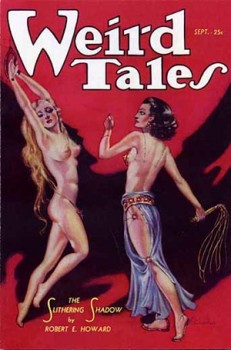
Howard’s liberal use of Lovecraftian horror elements and techniques, done with the express purpose of cementing his Hyborian Age into Lovecraft’s own proto-history, is obvious here in the presence of Thog, a demonic creature so overtly Lovecraftian that its very name itself is a distillation of Tsathoggua. The demonic entity from vast abyss beneath Xuthal is masterfully described, perhaps even more so than Lovecraft ever described one of his own alien entities. The passage when the captive Natala encounters Thog, creeping towards her, in the tunnels beneath Xuthal, is a master course in portraying a creature that does not conform to the laws of nature, and flagrantly disobeys the laws of physics itself.
Sexuality, straightforward or weird is also prevalent throughout the story once Conan and Natala reach Xuthal. While Conan shows Natala little sign of any affection or even a recognition of her gender (she might as well be a small child in the story prior to Xuthal), the first native of Xuthal they speak with tries to seduce her, and the second, Thalis, brazenly throws herself at Conan in front of Natala, emphasizing the extent of the decadence she has learned from the people of Xuthal, and suggesting that she alone can provide sensual pleasure greater than their dreaming stupors. Natala’s whipping scene is clearly there for prurient reasons, but is immediately followed by Thalis’ offscreen death, the sounds of which are described in such a way leaving little doubt that her death was not a “clean” one.
Though this is not strictly unique to Howard but is a characteristic of many pulp stories, there are dramatic reversals of fortune aplenty here, from Conan and Natala going from being part of a great army to its only apparent survivors, their near-death from heat exposure to the shelter of Xuthal, Conan pursued by a mob of enraged men of Xuthal and falling through a trapdoor only to land near Natala just as she needs him most, to his near-death state being washed away with a drink of the seemingly magic ambrosia of Xuthal.
Finally, the depiction of visceral combat has no equal here, no other single fight in the entirety of the Conan stories is as brutal, suspenseful, and as thoroughly described as is his battle with the demon-god Thog. While it’s obvious that the protagonist of a story usually emerges alive at the end, this is one of the few Conan stories where a fight ends and the reader is genuinely concerned at how he’s going to get through the next page, much less make it to his next story.
The Purity Test
As stated earlier, “Xuthal of the Dusk” is one of the purest Conan stories, if not the best. Purity is a much easier quality to judge than quality, and this story is unadulterated Conan. Due to the highly-adaptable nature of Conan himself and the genre-switching Howard did based on his own interests in the moment, the market at the time, and whatever his immediate inspiration was, the Conan stories are frequently less Conan stories than they are genre stories starring Conan (or sometimes not even starring Conan at all, such as with “A Witch Shall be Born” and “Beyond the Black River”). “Xuthal of the Dusk”, however, is clearly a Conan story through and through, with all the elements that support and highlight his role in the setting, and for this, it should be given special consideration when its relative quality is discussed.
There’s Something About Natala
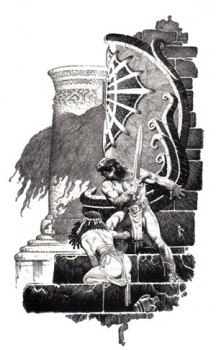
The veritable fly in the golden elixir, which many critics rightfully point to, is unfortunately its only sympathetic female character, Natala, the Brythunian slave. It isn’t clear what the nature of their relationship is — Conan either owns her or merely keeps her around and protects her — but given the range of options, it’s not likely to be for particularly altruistic reasons.
From the opening scene where she’s sitting on the ground clutching at his knee, to the very next scene where Conan contemplates killing her to spare her any unbearable hardship, Natala is an unfortunate but necessary part of the story and consistently its weakest point. She generally only states the obvious or asks questions that have no clear answer and generally is either in the way or needs to be rescued.
Even her erstwhile protector, Conan, shoves her unceremoniously into a chair when they find food, slaps her ass when she gets frightened, and later derides her when she accepts Thalis’s offer of a place to clean herself. She’s clearly a comely, full grown woman, but Thalis and Conan both address her as if she were a child. All of this, however, pales next to her humiliating, luridly-described, and wholly gratuitous whipping at the hands of the Stygian temptress.
If the goal of the scene was to display how insane Thalis was, by having her stop to whip a captive while a demon god is actively stalking the halls of the city hunting for fresh victims, then it serves that point and few others. This event, clearly, was Howard making a bid for cover art status, as Brundage’s covers sold better than others and she often picked which story to illustrate: the saucier and more provocative, the better.
All that said, though, and it’s not exactly easy to figure out what could have been done differently with the character. Remove Natala entirely from the story and it’s a “Conan finds lost city” yarn with no emotional stakes. He arrives, encounters a few Xuthal dreamers, meets Thalis, probably beds her, and either escapes the city the next day with a bag of stolen gold, or is captured and served up to Thog. It’s serviceable, but not particularly engaging. If Natala becomes a more independent character, then the contrast between she and Thalis is not so well-defined, and Conan’s defense of her becomes less chivalrous. It’s difficult to tell. Perhaps another draft and she might have emerged as a different character entirely.
From the Dusty Scrolls (Editor comments)
The fight with Thog is written superbly: One of the best combat scenes in the entire Conan Canon. I contrast that with Conan’s fight with the Lovecraftian-creature in “Vale of Lost Women.” They are polar opposites in quality confrontations.
Fritz Lieber was not a fan, saying that the story was “repetitious and childish, a self-vitiating brew of pseudo-science, stage illusions, and the ‘genuine’ supernatural.”
Conan had been part of Prince Almuric’s rebel army, which had been defeated in Koth, then “swept through the lands of Shem like a devastating sandstorm and drenched the outlands of Stygia with blood. With a Sygian host on its heels, it had cut its way through the black kingdom of Kush, only to be annihilated on teh edge of the southern desert.” That story has not yet been told as a pastiche: not in de Camp’s series, the Tor books, or by anyone else. I exclude Dark Horse – I haven’t read that story line yet.
Dark Horse adapted this story for issues 13 – 15 of Conan – The Avenger. I have not read those issues. Marvel’s Savage Sword of Conan covered it in issue 20.
Prior Posts in the Series:
Here Comes Conan!
The Best Conan Story Written by REH Was…?
Bobby Derie on “The Phoenix in the Sword”
Fletcher Vredenburgh on “The Frost Giant’s Daughter”
Ruminations on “The Phoenix on the Sword”
Jason M Waltz on “The Tower of the Elephant”
John C. Hocking on “The Scarlet Citadel”
Morgan Holmes on “Iron Shadows in the Moon”
David C. Smith on “The Pool of the Black One”
Dave Hardy on “The Vale of Lost Women”
Bob Byrne on Dark Horse’s “Iron Shadows in the Moon”
Next Week it’s Scott Oden with “The Devil in Iron”
Jason Durall combined two of his loves, role playing games, and Conan, when he became line editor for Modiphius’ marvelous Conan: Adventures in an Age Undreamed Of. He is also the line editor for Chaosium’s Runequest, as well as Basic Roleplaying.
 Bob Byrne’s ‘A (Black) Gat in the Hand’ was a regular Monday morning hardboiled pulp column from May through December, 2018.
Bob Byrne’s ‘A (Black) Gat in the Hand’ was a regular Monday morning hardboiled pulp column from May through December, 2018.
His ‘The Public Life of Sherlock Holmes’ column ran every Monday morning at Black Gate from March, 2014 through March, 2017 (still making an occasional return appearance!).
He also organized Black Gate’s award-nominated ‘Discovering Robert E. Howard’ series.
He is a member of the Praed Street Irregulars, founded www.SolarPons.com (the only website dedicated to the ‘Sherlock Holmes of Praed Street’) and blogs about Holmes and other mystery matters at Almost Holmes.
He has contributed stories to The MX Book of New Sherlock Holmes Stories – Parts III, IV, V and VI.
And he will be in the anthology of new Solar Pons stories coming this Spring.
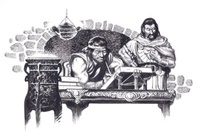
Not a story I ever warmed to. As with many, the whipping scene stands out in my memory, and not in any good way, being both distasteful and wholly gratuitous–the gristle in the meat, the missed bone in the fish filet–the flaw any decent chef would know would get the dish sent back. Which I suppose just shows Howard knew his editor, the cover artist, and/or the pulp audience better than I do. Plainly, getting the cover was important to Howard; but was it really worth the damage it does the story? Nope. The bad flavor it left overwhelmed everything else about the tale; I didn’t recall the evidently masterful Thog battle at all. Natala I did remember, but only as someone I felt sorry for. She did have a useful role in the story, in my view, as the one remotely sympathetic character in it. Thalia certainly didn’t qualify, and as for Conan, well, the “rough chivalry” sometimes spoken of (though not, I think, by Howard) is here very rough indeed.
I accidentally skipped Pool of the Black One and Vale of Lost Women, but this has been my least favorite so far.
I do like that the damsel in distress this time around seems to have a little more character. Conan seemed to care for her more than he does the other women he rescues. Something about Conan just feels a little off this whole story.
The depiction of Conan barely walking back all bruised and bloody was pretty good though.
I enjoyed this write-up, thanks Jason. I think the first 15 paragraphs to ‘Xuthul’ are terrific – they set quite the heroic-figure opening scene, leaving no doubt as to who’s the man, and what A Man at that! There is a lot of mystique and lurking horror on all sorts of levels, as Jason points out. In addition, there is actually quite a bit of Conan(REH)’s “grim humor” present, which I enjoy immensely. Overall, this is an enjoyable tale filled with a grand dose of Conan’s prowess and wit.
Brian – I thought that the battle was fantastic. And Conan wasn’t some superhero, shrugging it off afterwards. He took a beating. It’s worth a re-read. I think Howard did an excellent job with it.
Mr. Byrne:
Agreed. The battle, Thog and the description of Conan afterwards are some of the most vivid and memorable of Howard’s imagery.
I marvel at Brian’s inability to recall Conan’s battle with Thog. It’s a wincingly brutal throwdown between man and Lovecraftian monstrousity. I don’t think there’s another like it in all fantasy.
A number of years back I was camping in Northern Michigan with a collection of my old friends and the topic of great battles in fantasy fiction came up (you know, like it does) and someone asked, “What’s the toughest battle Conan ever fought?” And it was unanimous. Conan’s throwdown with Thog was it.
Well, in my defense it HAS been maybe forty years since I last read the thing. I was never big on the stories of Conan doing the lost-city-in-Kush bit (usually as a fugitive from some mercenary or pirate disaster). My favorites for revisiting are the thief and Pictish wilderness and king stories, with a few other selected highlights, like the Khoran and Koraja adventures and “The People of the Black Circle.” I suppose I’ll have to re-read this one, now…
This is one of Howard’s “middle period” Conan stories that I believe he rewrote. In this case, you can see the basic themes and structure here became the foundation for the far superior “Red Nails.”
I freely admit to harboring a fondness for this story, flaws and all, and I think Jason does a nice job here of enumerating its good points.
Frankly, the whipping scene never really made much of an impression on me one way or the other. For me it kinda fit in with the whole “degenerate race” theme of the story. But the scrap between Conan and Thog is spectacular and even horrifying; the highlight of the story for sure. The big Cimmerian can dish it out and take it too! Great analysis of an often overlooked tale.
Jason,
I really like the approach you took in saying while this isn’t the best Conan story, it is one of the purest. All the essential elements are there. As you point out, there is a big difference between quality and purity in a work of fiction.
Thanks Jason, you make a compelling argument for this being one of the top stories.